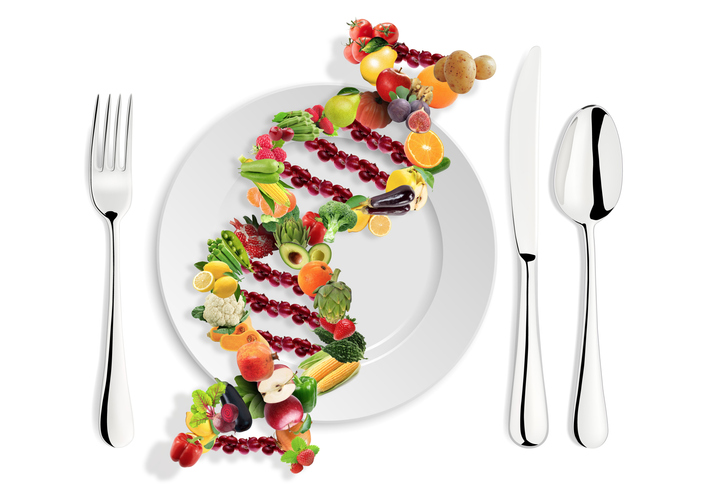 It is no secret that the United States is one of the most obese nations in the world. Currently, 60% of our citizens are overweight or clinically obese. The impact obesity is having on our collective health is significant. Secondary health conditions associated with obesity are predicted to bankrupt the healthcare system in the near future. Unfortunately, America is not just leading the pack in obesity. Americans are more likely to have chronic illness, cancer, autism, food allergies, and diabetes than those from other countries. Perhaps one reason for Americans’ poor health is the quality of our food supply. Instead of focusing on eating fewer calories (typical “diet” strategy) or restricting certain types of foods (eliminating fats vs. carbs), maybe Americans need to look at the quality of our food supply and how it differs so much from other countries.
It is no secret that the United States is one of the most obese nations in the world. Currently, 60% of our citizens are overweight or clinically obese. The impact obesity is having on our collective health is significant. Secondary health conditions associated with obesity are predicted to bankrupt the healthcare system in the near future. Unfortunately, America is not just leading the pack in obesity. Americans are more likely to have chronic illness, cancer, autism, food allergies, and diabetes than those from other countries. Perhaps one reason for Americans’ poor health is the quality of our food supply. Instead of focusing on eating fewer calories (typical “diet” strategy) or restricting certain types of foods (eliminating fats vs. carbs), maybe Americans need to look at the quality of our food supply and how it differs so much from other countries.
The first major difference between food in the United States (US) and the European Union (EU) is that Europeans do not let known or suspected carcinogens (cancer-causing agents) in their food.
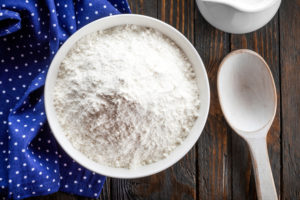 For instance, the widespread use of Potassium Bromate (added to flour to make dough rise higher and turn stark white) and Azodicarbonamide, or ADA (a whitening agent for cereal flour), are common in the US, but not allowed in the EU for human consumption. ADA is a dough conditioner to make bread stay soft and spongy longer. It is also used to inject bubbles into certain plastics to manufacture soft, spongy goods such as yoga mats and flip flops, gaining it the name the “yoga mat chemical.” Potassium Bromate has been found in lab animal studies to increase benign and malignant tumors in the thyroid and peritoneum (the membrane that lines the abdominal cavity) and cause significant increases in cancer of the animals’ kidneys, thyroid, and other organs. The EU, Canada, and Brazil deemed this information enough to ban these products from their food supply. The US did not.
For instance, the widespread use of Potassium Bromate (added to flour to make dough rise higher and turn stark white) and Azodicarbonamide, or ADA (a whitening agent for cereal flour), are common in the US, but not allowed in the EU for human consumption. ADA is a dough conditioner to make bread stay soft and spongy longer. It is also used to inject bubbles into certain plastics to manufacture soft, spongy goods such as yoga mats and flip flops, gaining it the name the “yoga mat chemical.” Potassium Bromate has been found in lab animal studies to increase benign and malignant tumors in the thyroid and peritoneum (the membrane that lines the abdominal cavity) and cause significant increases in cancer of the animals’ kidneys, thyroid, and other organs. The EU, Canada, and Brazil deemed this information enough to ban these products from their food supply. The US did not.
Perhaps an important factor in the differing approach to food quality in the EU and the US can be explained by their respective regulatory approaches. Europe takes a cautionary position and will pull a product or additive off the market if it has reason to believe it could cause harm; more of a “better safe than sorry” approach. The US operates under the “innocent until proven guilty model.”
 The US situation is worsened by the fact that the US government relies on the companies producing the products to prove their own guilt. As stated in a Natural Resources Defense Council report “no other developed country that we know of has a similar system in which companies can decide the safety of chemicals put directly into food.” The US Food and Drug Administration (FDA), with clear authority to regulate additives and animal drugs, does not have any authority over food itself. Instead, the FDA compiles a list of food and food ingredients that are Generally Recognized As Safe (GRAS). By using these GRAS ingredients, food companies are essentially protected from lawsuits that could occur under US liability law. Again, the companies who sell the product are the ones recognizing the product as safe and the FDA, by adding the product to the GRAS list, provides the company blanket protection from litigation.
The US situation is worsened by the fact that the US government relies on the companies producing the products to prove their own guilt. As stated in a Natural Resources Defense Council report “no other developed country that we know of has a similar system in which companies can decide the safety of chemicals put directly into food.” The US Food and Drug Administration (FDA), with clear authority to regulate additives and animal drugs, does not have any authority over food itself. Instead, the FDA compiles a list of food and food ingredients that are Generally Recognized As Safe (GRAS). By using these GRAS ingredients, food companies are essentially protected from lawsuits that could occur under US liability law. Again, the companies who sell the product are the ones recognizing the product as safe and the FDA, by adding the product to the GRAS list, provides the company blanket protection from litigation.
This is one reason why the US and EU food supplies are so different. For example, yellow dyes 5 & 6, red dye 40, blue dye 1, and caramel coloring, all FDA approved in the US as GRAS (therefore widely used by US food producers) are linked to neurological problems, allergies, brain cancer, ADD, and ADHD. Other countries do not share the US recognition of their “safety”, so these same chemical additives are banned in France, UK, Norway, Austria, and Finland.
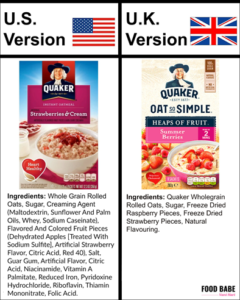 In addition to regulatory differences, citizens of the EU generally demand higher quality food than American consumers. For this reason, American food companies produce healthier versions of their products to sell overseas. Companies such as Heinz, Quaker Oats, and Mountain Dew (as well as others) have products with less chemical additives available for sale in European markets. These products are developed by US food producers because they know the products available for domestic use will not be accepted in Europe. When the US began using GMO’s, European citizens rejected these foods resulting in a US surplus of corn and soybeans. Corn exports to Europe, worth $305 million in 1995, decreased to $2 million in 2001 after the decision to use GMO’s.
In addition to regulatory differences, citizens of the EU generally demand higher quality food than American consumers. For this reason, American food companies produce healthier versions of their products to sell overseas. Companies such as Heinz, Quaker Oats, and Mountain Dew (as well as others) have products with less chemical additives available for sale in European markets. These products are developed by US food producers because they know the products available for domestic use will not be accepted in Europe. When the US began using GMO’s, European citizens rejected these foods resulting in a US surplus of corn and soybeans. Corn exports to Europe, worth $305 million in 1995, decreased to $2 million in 2001 after the decision to use GMO’s.
What are GMO’s and Why Does the US use them?
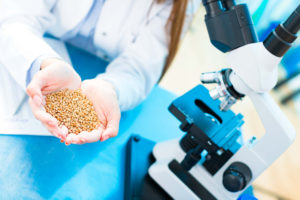 A GMO is a genetically modified organism developed in a lab where the DNA of one species is injected into the DNA of another species. Crops are genetically engineered to withstand pesticides (herbicide tolerant) or to contain a pesticide: Bacillus thuringiensis (Bt). In a Bt crop, every cell of the plant is genetically engineered (GE) to produce its own pesticide. When an insect eats any part of the plant, they die instantly. Each GMO variety is therefore considered a pesticide by the EPA. These plants are designed to tolerate massive doses of herbicides. This can be useful for farmers in the short-term because there are less invasive weeds around the crops and it provides protection from pest damage.
A GMO is a genetically modified organism developed in a lab where the DNA of one species is injected into the DNA of another species. Crops are genetically engineered to withstand pesticides (herbicide tolerant) or to contain a pesticide: Bacillus thuringiensis (Bt). In a Bt crop, every cell of the plant is genetically engineered (GE) to produce its own pesticide. When an insect eats any part of the plant, they die instantly. Each GMO variety is therefore considered a pesticide by the EPA. These plants are designed to tolerate massive doses of herbicides. This can be useful for farmers in the short-term because there are less invasive weeds around the crops and it provides protection from pest damage.
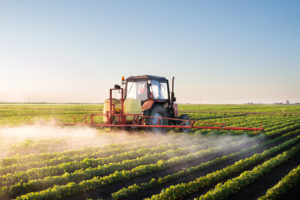 But the highly toxic chemicals, specifically Glyphosate, that are being sprayed on the plants are absorbed through the skin of the fruit or vegetable and are present, even after washing. As a result, people who eat these Glyphosate tolerant crops are consuming a chemical that, despite its acceptance by the FDA, is a known probable carcinogen. Ninety percent of the corn, sugar, and soy grown in North America is genetically engineered. As a result, 85% of processed foods sold in America contain GMO’s. Yet, the FDA does not require any pre-market safety testing of genetically engineered foods.
But the highly toxic chemicals, specifically Glyphosate, that are being sprayed on the plants are absorbed through the skin of the fruit or vegetable and are present, even after washing. As a result, people who eat these Glyphosate tolerant crops are consuming a chemical that, despite its acceptance by the FDA, is a known probable carcinogen. Ninety percent of the corn, sugar, and soy grown in North America is genetically engineered. As a result, 85% of processed foods sold in America contain GMO’s. Yet, the FDA does not require any pre-market safety testing of genetically engineered foods.
According to the Institute for Responsible Technology (IRT) “Several animal studies (in 2009) indicate serious health risks associated with genetically modified (GM) food including infertility, immune problems, accelerated aging, faulty insulin regulation, and changes in major organs and the gastrointestinal system.” GMO’s are banned or labeled in 64 other countries, but not in the US.
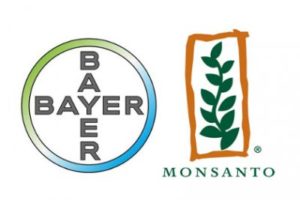 The issue with GMO’s and Glyphosate in the American food supply is complicated by the fact that one company, Monsanto (owned by Bayer), sells both the herbicides (Roundup) and the genetically modified seeds used to produce these crops. Monsanto has a rich history of producing poisons for mass application: the insecticide DDT, PCBs, Agent Orange, aspartame, and bovine growth hormone. Though the EPA has deemed Roundup safe, many people have concerns about the safety for use in our food supply — a food supply disproportionately owned by Monsanto corporation.
The issue with GMO’s and Glyphosate in the American food supply is complicated by the fact that one company, Monsanto (owned by Bayer), sells both the herbicides (Roundup) and the genetically modified seeds used to produce these crops. Monsanto has a rich history of producing poisons for mass application: the insecticide DDT, PCBs, Agent Orange, aspartame, and bovine growth hormone. Though the EPA has deemed Roundup safe, many people have concerns about the safety for use in our food supply — a food supply disproportionately owned by Monsanto corporation.
As of the writing of this article, Monsanto owned or provided GMO food products to 68 food companies including Aunt Jemima, Betty Crocker, Coca-Cola, General Mills, Green Giant, Kellogg’s, Procter & Gamble, and Quaker to name a few. For a complete list, please click here. Monsanto has also recently lost 3 lawsuits alleging their product (RoundUp) causes cancer, specifically non-Hodgkins lymphoma.
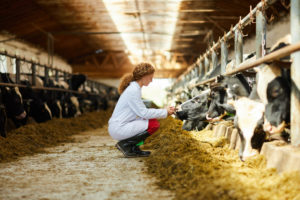 Interestingly, the reasons that other countries are opposed to GMO’s and GE foods are not exclusively related to health concerns. The original distrust of GMO’s in Europe goes back to the introduction of recombinant Bovine Somatotropin (rBST), a growth hormone used to extend the lactation cycle in dairy cows, that was introduced in the mid 1980’s. Europeans were concerned that this new technology would jeopardize the economic sustainability of mid-size dairy farms. Additionally, groups in Canada and Europe ruled against rBST on the grounds that it was unethical to the animals as it induces higher milk production which increases the risk of mastitis, a painful infectious condition of breast tissue, in dairy cows. Citizens of other countries mobilized out of concerns for the long-term implications to the environment, their culture, and the ethical treatment of farm animals.
Interestingly, the reasons that other countries are opposed to GMO’s and GE foods are not exclusively related to health concerns. The original distrust of GMO’s in Europe goes back to the introduction of recombinant Bovine Somatotropin (rBST), a growth hormone used to extend the lactation cycle in dairy cows, that was introduced in the mid 1980’s. Europeans were concerned that this new technology would jeopardize the economic sustainability of mid-size dairy farms. Additionally, groups in Canada and Europe ruled against rBST on the grounds that it was unethical to the animals as it induces higher milk production which increases the risk of mastitis, a painful infectious condition of breast tissue, in dairy cows. Citizens of other countries mobilized out of concerns for the long-term implications to the environment, their culture, and the ethical treatment of farm animals.
 Collective concern on the part of European citizens has led to the EU banning and restricting the use of numerous neonicotinoids, a new class of insecticides chemically related to nicotine, that has been linked to declining honey bee populations. Honeybees are a critical part of the food web as we rely on them to pollinate food crops. There are contradictory findings on the connection between this class of insecticides and the rapid decline of the honeybee population, so the EU acts on the side of caution and doesn’t permit their use. Insect pollinators transfer pollen to flowers and assist with the fertilization of a diverse array of flowering plant and food products. For some flowering plants, such as almonds and apples, non-insect pollination through the wind is ineffective. Many food plants dependent on insects for pollination. Many farmers require the services of beekeepers, who rent commercial beehives to pollinate their crops.
Collective concern on the part of European citizens has led to the EU banning and restricting the use of numerous neonicotinoids, a new class of insecticides chemically related to nicotine, that has been linked to declining honey bee populations. Honeybees are a critical part of the food web as we rely on them to pollinate food crops. There are contradictory findings on the connection between this class of insecticides and the rapid decline of the honeybee population, so the EU acts on the side of caution and doesn’t permit their use. Insect pollinators transfer pollen to flowers and assist with the fertilization of a diverse array of flowering plant and food products. For some flowering plants, such as almonds and apples, non-insect pollination through the wind is ineffective. Many food plants dependent on insects for pollination. Many farmers require the services of beekeepers, who rent commercial beehives to pollinate their crops.
Research from the Center from Food Safety indicates 70% of plants would be unable to reproduce or provide food without honeybee pollination. In North America, honeybees alone pollinate nearly 95 kinds of fruits, such as almonds, avocados, cranberries and apples, in addition to commodity crops like soy. Pollination services are a core component of global agricultural production; the value of pollination services is estimated to be $20-30 billion annually in the US alone.
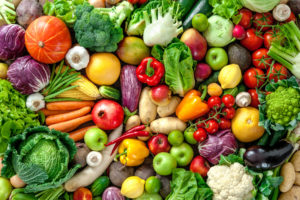 Failure to take the environment into consideration when making decisions about food production is also having widespread implications for biodiversity. Biodiversity is the amount of variety of life on Earth including all the different species of plants, animals, and microorganisms. A report released by the United Nation’s Intergovernmental Science-Policy Platform on Biodiversity and Ecosystem warns as many as 1 million species, including plants and seeds, are now at risk of extinction if humans don’t change their behavior quickly. The implication on declining biodiversity on our food supply is significant.
Failure to take the environment into consideration when making decisions about food production is also having widespread implications for biodiversity. Biodiversity is the amount of variety of life on Earth including all the different species of plants, animals, and microorganisms. A report released by the United Nation’s Intergovernmental Science-Policy Platform on Biodiversity and Ecosystem warns as many as 1 million species, including plants and seeds, are now at risk of extinction if humans don’t change their behavior quickly. The implication on declining biodiversity on our food supply is significant.
As the world’s food supply becomes increasingly globalized and homogeneous “fewer and fewer varieties and breeds of plants and animals are being cultivated, raised, traded and maintained around the world.” Species are dependent on each other as they create the environment and the food supply for one another. Genetically engineering one species, due to the nature of the food chain, can impact countless other species. Glyphosate has infiltrated all levels of the food chain. Studies have found Glyphosate in the water supply, in numerous plants and animals, and even in human breast milk samples.
Movement to Stop Use of GMO’s
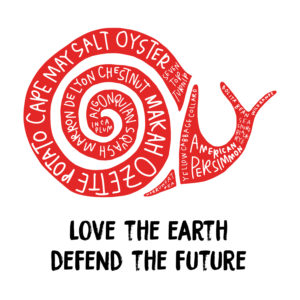 In the late 90’s, the Slow Food Movement was born in Italy in response to a McDonald’s restaurant opening near the Spanish Steps in Rome. The organization began as an opposition to fast food, industrial food production, and globalization of the food supply. The Slow Food Movement has spread across the globe and they have already catalogued 5,000 food products that need to be saved across countless countries. These food products typically have strong ties to their countries’ culture and are at risk for extinction. It is no surprise that this movement does not support the use of GMO’s.
In the late 90’s, the Slow Food Movement was born in Italy in response to a McDonald’s restaurant opening near the Spanish Steps in Rome. The organization began as an opposition to fast food, industrial food production, and globalization of the food supply. The Slow Food Movement has spread across the globe and they have already catalogued 5,000 food products that need to be saved across countless countries. These food products typically have strong ties to their countries’ culture and are at risk for extinction. It is no surprise that this movement does not support the use of GMO’s.
According to the Slow Food Movement International, the use of GMO’s has “reduced biodiversity, polluted landscapes, threatened the future of small-scale farming, and reduced the food security of the world’s poorest people. They have not fed the world, but rather concentrated profits and power into the hands of a few ruthless companies. It’s time to stop the big scam.”
 Other countries seem to more quickly understand the interconnection between the food supply, human health, and the health of the environment. Current US food production practices damage the planet we rely on to produce the food, water, oxygen, and resources needed to sustain human existence. The state of America’s ill-health related to our food supply is a good barometer for the health of our planet.
Other countries seem to more quickly understand the interconnection between the food supply, human health, and the health of the environment. Current US food production practices damage the planet we rely on to produce the food, water, oxygen, and resources needed to sustain human existence. The state of America’s ill-health related to our food supply is a good barometer for the health of our planet.
As we produce food that is unnatural for our bodies, and without understanding the implications to the larger food web, we put our personal health and the health of our entire planet at risk. Citizens from other countries seem to understand this connection already; Americans would benefit from following in the footsteps of other countries and ban products that destroy our health and the health of our planet.

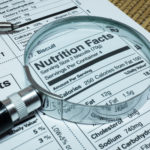

Thank you for this article. As a recent immigrant to the US, the quality of food ingredients is something we have noticed and are very concerned with. Even when I travel to Canada for business the difference in food quality is easy to notice. The US consumer needs to wake up and realize how bad they have it here. We don’t deserve this and we have to take action to make our quality of life better
Sam Kass and Michelle Obama started an initiative for schools and better eating for children. We have to support this, what we are eating is very dangerous…..
Thanks for the eye opening article.
A lot of us are indeed waking up, Daniel. We just cannot seem to stop this horrible alliance with the powers that be and corporations that only have their bottom line in mind, and no concern for the damage they are doing not only to the US. but the world environment. We are fighting this whenever and wherever we can, but so far we seem to be losing at every turn. In the meantime, those of us in the know, buy organic/and or local, and sustainable whenever possible.
I agree with you 100% I have a autistic grandson and see more of it,I’m 71 and when I was growing up my mom picked field greens and they have a garden and raised any meat we ate. Kids then didn’t get the junk food that we have now, SOMETHING NEEDS TO BE DONE HERE in the US.
Does anyone know if European food companies make a different product to sell to the US that would be ineligible/illegal for them to sell in Europe? In other words, are they making products to sell US consumers that contain ingredients that they are prohibited from selling in Europe?
I ask because the desire for profit is world wide, and I wonder if European companies somehow can exploit the difference between US and European regulations, or if European products sold here are any “safer” for those of us seeking to avoid GMO and other European banned ingredients.
Does anyone know?
Yes, one example is nutella. You can google “nutella ingredients us vs europe”.
The european one takes better
Yes, Nescafe. In Europe this instant coffee is delicious. In the US it is not, and does not taste at all the same. Several years ago I called about it and was told that, even though they make it under license using the name, they make it to American taste. I was offered a free coupon which was ridiculous since I could not get the Nescafe coffee which people drink in Europe.
Funny how Europeans talk about the unhealthy diet of Americans with out ever acknowledging that a majority of this food is made and controlled by European countries. Where I live most the stores are 90% Nestle and 10% Unilever and all pure crap food.
That means my available food is controlled by the Swiss, Brittish, and Dutch and all local food has been pushed out by contract with the store or most times the distributors.
Perhaps our European friends could actually take these people to task for poisoning other countries instead of having a laugh at their victims.
With all due respect, there is request and offer. Companies create recipes based on request from the buyer. Nutella in different in the US because, per producer, the Euro version did not taste sweet enough for Americans.
Nestle and Unilever are not really food producers, more like condiments, beverages and snaks. That’s not food. And they don’t really “control”. At least not in the US.
I don’t feel like anyone is taking any laugh here, it’s not funny when you live here and have no choice but eat this food. Trust me. It’s not easy, especially when you know there’s better out there.
There are a lot of good things about US. Food is simply not one of them. And America doesn’t seem to want to wake up.
Very well, dont forget, education has a value. Most GMO food are not only fake but also less perishable. Put your money where your mouth is.
I just saw some New Zealand produce on television and I couldnt believe my eyes. The strawberries were red through and through – not the kind we have in this country which are completely white inside with a fake red dye on the outside.
Big corpa and Monsanto in particular will be the death of the planet. Satan has taken a new form in this past couple decades.
It is also a cultural issue. In American business, the only price is the lowest price period. It’s the Sam Walton, Walmart mentality so to speak. The problem is that that mentality inevitably leads to these types of detrimental outcomes, re: soil and quality degradation, additives, shelf-life preservatives, and so on, etc. Europeans in general still have somewhat of a greater mind for quality over quantity. But since 150 million Americans, or roughly 50% of the US adult population, shop at Walmart every week, the demand is going to continue to drive these trends unless otherwise regulated. Sad really.
Great article!!